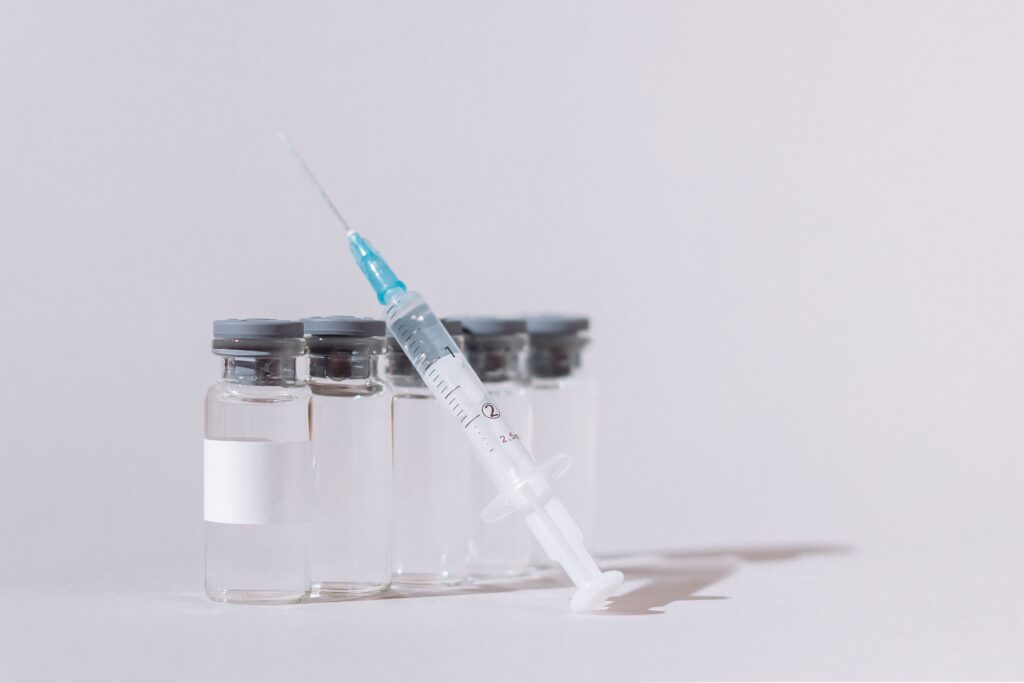

Veterinary Review Initiative
The information in this resource was reviewed for accuracy and clarity by a qualified Doctor of Veterinary Medicine with farmed animal sanctuaryAn animal sanctuary that primarily cares for rescued animals that were farmed by humans. experience as part of Basic Sheep And Goat Care Part 2 course creation, in November 2022. Check out more information on our Veterinary Review Initiative here!
A Note For Readers From Outside Of The US
Whenever possible, we strive to create resources that can serve the global sanctuary community, but some topics require a more specific focus. While folks caring for sheep outside the US can still gain valuable information from this resource, we do want to point out that it is focused on vaccine recommendations in the US. Because disease risk can vary by geographical location, and vaccine availability and regulations differ from country to country, some of the information below may not apply to sheep outside the US.
Vaccines can play an important role in helping to keep residents healthy, but it’s important to work with your veterinarian to establish the most appropriate vaccine protocols based on the specifics of your resident population and your region. You can read a bit more about working with your veterinarian to establish a vaccine program for your residents here.
Many vaccines for sheep are available at farm supply stores or online, but this does not mean that they are all necessary or even appropriate for your residents. Currently, the only universally recommended vaccine for sheep is one to protect against clostridial disease. However, some sanctuaries also vaccinate residents for rabies, and some with CL-positive residents use vaccination both for protection and to reduce clinical signs. There may be additional vaccines your veterinarian recommends based on the diseases that are prevalent in your region and/or the diseases present at your sanctuary. All vaccination protocols (i.e. which vaccines to use, the frequency of boosters, age restrictions, etc.) should be discussed with your veterinarian before implementing.
Ongoing Communication Is Key!
Once you establish vaccination protocols in consultation with your veterinarian, be aware that they may recommend delaying or avoiding certain vaccines in sheep who are ill. Be sure to check in with them for specific guidance.
Below, we’ll offer general information about some of the vaccines that tend to come up most often when caring for sheep in sanctuary spaces, but you should defer to your veterinarian for specific recommendations for your sheep residents. They may strongly recommend other vaccines that are not listed here based on the diseases that are prevalent in your area.
Clostridium perfringens types C and D and tetanus (Core Vaccine)
There are many clostridial organisms that can live in the soil and even in the gastrointestinal tract of healthy animals. While there are a host of clostridial organisms that can cause disease in sheep, the most common are Clostridium perfringens types C and D and Clostridium tetani. Because of the prevalence of these pathogens and the fact that they produce toxins that often cause fatal disease, vaccination is universally recommended for small ruminants. There is a three-way vaccine, referred to as “CDT,” that protects against all three of these pathogens and the diseases they cause, as well as a seven- and eight-way vaccine that protects against additional clostridial diseases as well. Talk to your veterinarian about which vaccine makes the most sense for your residents, as additional clostridial diseases may be a concern in certain regions.
It is especially important to ensure residents are current on this vaccine when they are neutered or after sustaining a wound. To ensure lambs receive passive immunity, pregnant sheep residents should be vaccinated towards the end of their pregnancy, with specific timing dependent on whether or not they have been previously vaccinated. Your veterinarian can make specific recommendations.
Individuals may develop injection site abscesses following vaccination. In order to differentiate between injection site abscesses and another possible cause, it’s helpful to vaccinate everyone in the same spot (and on the same side of their body) so that you can more easily determine if an abscess is at the injection site or if it could be caused by something else (namely, CL).
Rabies
In many states, only a licensed veterinarian can administer rabies vaccines. Sheep are typically vaccinated annually for two consecutive years and then every 3 years after that. Be sure to record the date the vaccine was administered as well as the vaccine brand and serial number. If your veterinarian administered the vaccine, ask them for documentation for your records.
Caseous Lymphadenitis
While vaccination does not eliminate or cure CL, it can offer your residents a certain degree of protection and, in CL-positive individuals, vaccination can reduce the instance of clinical signs. Studies of sheep have shown that vaccination has resulted in fewer abscesses. Be aware that vaccinated individuals may test positive for CL on blood tests.
A Quick Note On Dosing
Because sheep range in size depending on their breed and age, caregivers may wonder if smaller individuals require smaller doses than other sheep. The answer is that they do not. While you may need to wait for a very young lamb to reach a certain age before they receive certain vaccinations (following label instructions or your veterinarian’s recommendations), everyone who is eligible for vaccination will receive the same dose as other members of their species regardless of their weight.
SOURCES:
Sheep And Goat Medicine, Second Edition (Non-Compassionate Source)
CDT Vaccinations | Maryland Small Ruminant Page (Non-Compassionate Source)
Non-Compassionate Source?
If a source includes the (Non-Compassionate Source) tag, it means that we do not endorse that particular source’s views about animals, even if some of their insights are valuable from a care perspective. See a more detailed explanation here.








